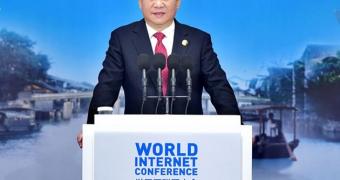China's President Xi Jinping invoked "cyber sovereignty" to describe his country's right to create its national cyber policy while giving the opening speech at the second World Internet Conference, held in Wuzhen, Zhejiang, on December 16.
"We should respect the right of individual countries to independently choose their own path of cyber development, model of cyber regulation, and participate in international cyberspace governance on an equal footing," said President Xi. "No country should pursue cyber hegemony, interfere in other countries' internal affairs or engage in, connive at or support cyber activities that undermine other countries’ national security."
Mr. Xi believes that the right to cyber sovereignty is rooted and guaranteed by the United Nations Charter itself, referring to the principle that any country is allowed to manage its own state affairs, this also including the Internet.
Xi's controversial statement is correct from a legal standpoint
The President's statements were first regarded as a way for his regime to explain and pardon its intrusive censorship laws, which, at some times, have even hindered Google's presence in the country.
While controversial at first, at a second look, international law experts say that President Xi is right to claim such right, since theoretically, the UN Charter covers a country's cyberspace as well.
While Mr. Xi might have found a legal way to explain the country's harsh Internet censorship methods, there remain accusations, from many countries around the globe, linked to China's offensive hacking operations.
As usual, on the topic of hacking, Mr. Xi remained mum, and as always, continued to act like nothing had ever happened. "The cyberspace should not become a battlefield of countries to wrestling one another; it should neither become a hotbed for crime," he later said, urging countries to collaborate to bring down terrorism, pornography, drug trafficking, money laundering, and illegal gambling that take place online.

 14 DAY TRIAL //
14 DAY TRIAL //